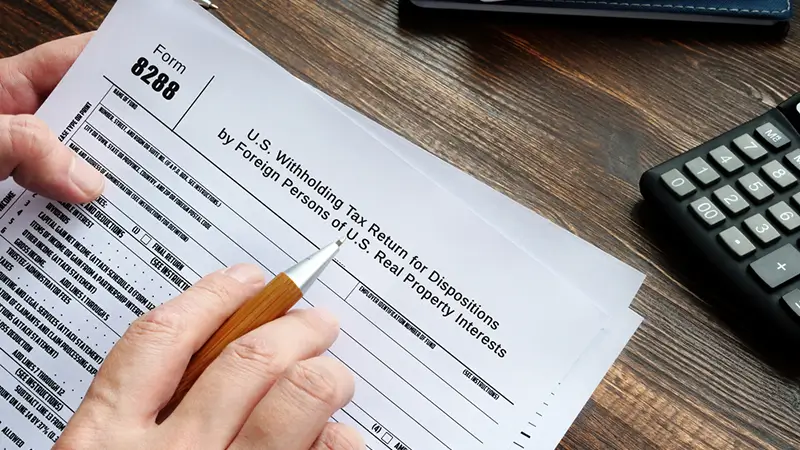Certificate of Foreign Person's Claim That Income Is Connected
If you are a foreign individual or entity earning income from U.S. sources, knowing how to manage your tax obligations is crucial. The Certificate of...
12 min read
 H&CO
Nov 29, 2024 6:54:53 AM
H&CO
Nov 29, 2024 6:54:53 AM

If you’re a foreign seller of U.S. real estate, applying for a FIRPTA Withholding Certificates Application can lower the tax withheld at sale. This guide explains how to apply using Form 8288-B, the necessary documentation, and key steps.
Key Takeaways |
|
CONTENT INDEX
The Foreign Investment in Real Property Tax Act (FIRPTA) is a U.S. federal law enacted in 1980 to ensure that foreign individuals and entities pay taxes on gains from the sale of U.S. real property interests. Under FIRPTA, when a foreign person disposes of such property, the buyer is required to withhold a portion of the gross sale price—typically 15%—to cover potential tax liabilities. The withheld amount is remitted to the IRS and if the seller does not file taxes, the government already has the money. The primary purpose of FIRPTA is to prevent tax evasion by foreign investors and ensure that the U.S. government collects taxes on income generated from the sale of real property located within the United States. This law promotes fairness and compliance in the taxation of cross-border real estate transactions.
Before FIRPTA, the foreign sellers would sell US real estate taxes and they did not pay taxes on the gain of the sale. There was little the government was able to do to collect the taxes.
The IRS allows foreign sellers of U.S. property to adjust the standard 15% withholding tax through a FIRPTA Withholding Certificate application. This adjustment is vital when the withholding amount significantly exceeds the seller's actual tax liability, which can frequently occur in real estate transactions. By applying for a withholding certificate, sellers can reduce the withheld amount to align with their true tax obligation, improving cash flow and avoiding unnecessary financial strain. To ensure timely processing, applications should be submitted before closing, as the IRS typically takes 90 days to respond, though delays can occur. Additionally, all parties involved, including the buyer and seller, must have or apply for U.S. tax identification numbers (TINs) to comply with FIRPTA requirements.
Applying for a FIRPTA Withholding Certificate involves completing and submitting Form 8288-B, which requires detailed information about the property transaction, including the sale price, property description, and estimated tax liability. The form must be signed by the applicant or an authorized representative, and supporting documents, such as purchase agreements and proof of compliance, should be attached. The application is submitted to the IRS center in Ogden, Utah, where centralized processing ensures consistency.
FIRPTA Withholding Certificates enable foreign sellers to adjust the standard 15% withholding tax to reflect their actual tax liability, helping to avoid over-withholding and unnecessary financial burdens. The certificate ensures compliance with IRS regulations and facilitates accurate reporting of the seller’s taxable income. To obtain a withholding certificate, sellers must submit Form 8288-B with transaction details, including the nature of the property and sale price, and ensure all information is accurate.
Eligibility for FIRPTA Withholding Certificates is primarily determined by the circumstances of the U.S. real property transaction and the foreign seller's tax liability. Foreign persons disposing of U.S. real property interests can apply for a certificate if they can demonstrate that the required withholding exceeds their actual tax liability. This may include cases where the seller anticipates minimal or no tax due, such as transactions with little or no gain, exemptions, or when an installment sale agreement applies. The applicant must provide evidence, including detailed transaction information and relevant tax calculations, to support their request for reduced withholding. Accurate and timely submission of Form 8288-B is essential to establish eligibility and secure IRS approval.
The Section 1445(e) rules for FIRPTA withholding certificates are a set of regulations that apply to specific scenarios involving the distribution of U.S. real property interests by corporations, partnerships, trusts, and estates. These rules, outlined in U.S. Code 1445(e), are crucial for ensuring that the correct withholding amount is applied in these transactions.
For instance, when a corporation distributes U.S. real property interests to its shareholders, or a partnership distributes such interests to its partners, the Section 1445(e) rules come into play. These rules ensure that the withholding tax accurately reflects the transferor’s maximum tax liability, preventing over-withholding and ensuring compliance with the IRS regulations.
By adhering to Section 1445(e) rules, applicants can ensure that their withholding amounts are correctly adjusted, facilitating smoother transactions and compliance with the Real Property Tax Act.
When a foreign person or entity sells a U.S. real property interest, the transaction may be subject to both corporate and personal income tax implications. These implications arise from the sale of the property itself and the distribution of the proceeds to the foreign person or entity.
When a U.S. corporation sells real estate, the gain from the sale is subject to federal corporate income tax at the applicable rate, currently 21%, along with any state or local taxes depending on the property's location. If the corporation selling the property is classified as a U.S. real corporation, FIRPTA would not apply. For foreign corporations selling U.S. real estate, the transaction is subject to FIRPTA, requiring a 21% withholding tax on the gain unless reduced or exempted by an FIRPTA Withholding Certificate. Additionally, the gain is treated as effectively connected income (ECI) and taxed at U.S. corporate rates, with potential branch profits tax implications if the foreign corporation operates as a branch rather than a U.S. subsidiary.
Foreign investors can strategically minimize the impact of FIRPTA by purchasing U.S. real estate through a U.S. corporation rather than holding the property directly. When structured properly, the corporation becomes the owner of the real property, and FIRPTA withholding only applies if the foreign investor later sells their shares in the corporation, provided it qualifies as a U.S. real property holding corporation. This approach can offer greater flexibility for managing withholding requirements and potentially reduce tax exposure when disposing of the asset. However, it's essential to consider other tax implications, such as corporate-level income tax on gains and double taxation risks, and consult a tax advisor to ensure compliance and optimize tax outcomes.
When foreign individuals purchase U.S. real estate at the personal level, they face specific tax implications when they later sell the property. Under FIRPTA, 15% of the gross sale price is withheld at the time of sale to ensure tax compliance, regardless of the actual profit or gain. If personal property is included in the sale, it can also impact the overall tax liability and withholding requirements. The foreign individual must then file a U.S. tax return to calculate the net tax liability based on the gain from the sale, which is taxed at the individual income tax rates (up to 37% for ordinary income or 20% for long-term capital gains, depending on the holding period and applicable tax treaties). In addition, state and local taxes may apply, further affecting the net proceeds. Proper planning and timely application for a FIRPTA Withholding Certificate can help mitigate excessive withholding and improve cash flow.

Begin by gathering all necessary information about the transaction, including the property details, sale price, and the identities of both the buyer and seller. Completing IRS Form 8288-B is the cornerstone of the application process, and accuracy is essential to avoid delays. If an authorized agent is applying on your behalf, include Form 2848 (Power of Attorney and Declaration of Representative) to grant them the authority to act for you. Ensure all forms are signed and completed before submission.
To maximize the likelihood of approval, file Form 8288-B before the property transfer date. If the application is submitted after the transfer, include all required documentation to demonstrate eligibility and compliance, as the IRS may still process late applications under certain circumstances. Submit the completed application and supporting documents to the IRS center in Ogden, Utah. Double-check your submission for completeness to avoid processing delays.
Form 8288-B is the critical form for applying for a FIRPTA Withholding Certificate. The form must include precise details about the U.S. real property interest being transferred, such as its location, contract price, and type of interest. Additionally, provide the taxpayer identification numbers (TINs), names, and addresses of both the buyer and the seller. These details ensure the IRS can accurately evaluate the transaction and determine the appropriate withholding amount.
The application must be signed by the applicant or an authorized representative, and if the latter, include a properly executed Form 2848. Depending on the nature of the transaction, additional documentation may be required, such as contracts, third-party verifications, or proof of tax compliance. Thorough and accurate completion of Form 8288-B and the inclusion of all necessary supporting documents are essential for a smooth application process.
Completing Form 8288-B accurately is crucial to the success of your FIRPTA withholding certificate application. The form requires the transferor's (seller’s) and transferee's (buyer’s) names, addresses, and contact details, as well as comprehensive transaction information, including the type of real property interest and the contract price. This information enables the IRS to evaluate the withholding amount properly.
Submit the form as soon as the property is under contract but before the closing date to ensure timely processing. Complete all sections of the form applicable to your transaction and attach all supporting documentation. Incomplete or inaccurate forms can lead to delays, so carefully review your application before submission. Following these steps will help ensure that your withholding certificate is processed efficiently.
In some cases, alternative methods may be used to apply for a FIRPTA withholding certificate, especially if unique transaction circumstances make it challenging to complete a standard Form 8288-B. For example, foreign corporations or partnerships with income connected to U.S. businesses may qualify for alternative documentation to meet IRS requirements.
These methods involve submitting comprehensive supporting documents that demonstrate compliance with FIRPTA regulations. This may include proof of tax compliance, agreements, and other relevant information about the transaction. Understanding these alternatives allows applicants to adapt to specific situations while ensuring compliance and achieving the same outcome as the standard process.
Certain scenarios may allow for the submission of a FIRPTA withholding certificate application without using Form 8288-B. For instance, foreign corporations or partnerships with specific IRS designations may qualify to bypass the form if they provide adequate alternative documentation. This method can simplify the process for those meeting the criteria.
To apply without Form 8288-B, applicants must supply detailed transaction records, tax compliance evidence, and any additional information required by the IRS. Following the guidelines for this alternative method ensures compliance with FIRPTA regulations and a streamlined application process for eligible applicants.
Certain applications under FIRPTA involve special categories requiring additional documentation or conditions. For example, applying for a blanket withholding certificate to cover multiple property transactions over a specific period requires submitting an irrevocable letter of credit or security guarantee. This category is particularly beneficial for frequent transactions, such as those by real estate investors or developers.
Other special categories may involve the use of alternative securities approved at the IRS’s discretion. Applicants must provide detailed justifications, agreements, and security instruments to support their case. Understanding these specialized categories and adhering to their requirements ensures proper processing of more complex FIRPTA applications.
After completing your FIRPTA withholding certificate application, mail it to the IRS center in Ogden, Utah, at the designated address: P.O. Box 409101, Ogden, UT 84409. Double-check that all required forms and supporting documents are included, as incomplete submissions can lead to delays or rejection. For international applications, ensure the submission is postmarked by the property transfer date.
Timely mailing is essential to allow the IRS enough time to review and process your application. Retain proof of mailing and copies of all submitted documents for your records. Following these steps ensures your application is submitted correctly and reaches the IRS for efficient processing.
After submission, the IRS typically takes 90 days to process a complete FIRPTA withholding certificate application. During this time, applicants should monitor the status of their submission by contacting the IRS or checking for updates. If amendments are necessary, such as correcting errors or providing additional information, submit a revised statement to the same address.
Amendments may extend the IRS’s processing time by up to 30 days or more for significant changes. To avoid unnecessary delays, ensure your original application is accurate and complete. Proactively tracking your application and responding promptly to IRS requests can expedite the approval process.
Common issues with FIRPTA withholding certificate applications include incomplete submissions, errors in transaction details, and delays caused by late filing. To avoid these problems, ensure all required forms and supporting documents are accurate, signed, and submitted on time.
Another frequent issue arises when transferees fail to withhold the correct tax amount, potentially resulting in liability for penalties and interest. Ensure compliance with FIRPTA regulations and verify that all withholding requirements are met.
Once your application is submitted, the IRS will review it and determine the appropriate withholding amount. The typical processing time is 90 days for complete applications, but any amendments or additional documentation requests can extend this timeline. If the withholding certificate is not issued by the closing date, buyers can escrow the withholding amount until the IRS decision is finalized.
Understanding the post-application process helps set realistic expectations and ensures all parties are prepared for potential delays. Maintaining communication with the IRS and providing any requested information promptly can help expedite the process and minimize disruptions to the transaction.

Foreign persons can apply for FIRPTA withholding certificates from abroad using Form 8288-B. If an Individual Taxpayer Identification Number (ITIN) is required, they should also submit Form W-7. This ensures that the IRS can track and process the application properly.
When applying without a Tax ID, attaching Form W-7 to request an ITIN is essential. The FIRPTA withholding certificate application should be mailed to the escrow or closing company, with their information noted in Box 5 of Form 8288-B. This helps ensure that all relevant parties are informed and the application is processed correctly.
Engaging professionals familiar with FIRPTA is crucial to prevent costly mistakes during the transaction process. These professionals can provide valuable guidance and ensure that all requirements are met, helping to streamline the application process.
Applicants who do not have a Taxpayer Identification Number (TIN) can still apply for a FIRPTA withholding certificate by including Form W-7 with their application. This form is used to request an Individual Taxpayer Identification Number, which is necessary for processing the application.
Both the transferor (seller) and transferee (buyer) can request a FIRPTA withholding certificate without a tax ID. To do so, they must submit Form W-7 along with Form 8288-B, ensuring that all necessary information is included.
The application must be signed by an authorized individual, confirming the accuracy of the information provided. This signature is crucial for verifying the authenticity of the application and ensuring that all details are correct. If any amendments are needed, an amending statement can be submitted to modify the application, which should include specific identifying details.
For those involved in multiple property transactions, requesting a blanket FIRPTA withholding certificate can be a practical solution. This certificate can cover all property transactions for the next year, simplifying the process and reducing the need for multiple applications.
To obtain a FIRPTA withholding certificate for multiple transactions, the applicant can submit a blanket withholding certificate, which is valid for up to 12 months. This certificate allows for the adjustment of withholding amounts on multiple transactions, ensuring that the withheld amounts are accurate and reflective of the actual tax liability. Wealth taxes can also play a role in the overall tax planning and compliance for multiple high-value transactions.
Applicants are required to submit an irrevocable letter of credit or guarantee. Additionally, they must include a tax payment and a security agreement with the IRS. These documents ensure that the IRS has the necessary security for the transactions and that the applicant is compliant with all requirements. Applications under Category Four regarding security agreements must include an explanation of maximum tax liability, a signed agreement, and the security instrument.
Applying for FIRPTA Withholding Certificates can significantly impact the financial outcomes of foreign investors in U.S. real estate. By understanding the eligibility criteria, required documentation, and detailed steps involved in the application process, applicants can ensure that their withholding amounts are accurately adjusted.
The process involves submitting Form 8288-B, gathering supporting documentation, and potentially utilizing alternative application methods or special categories for complex situations. Ensuring accurate and timely submission is crucial to avoid common issues and penalties.
By following the guidelines provided in this blog post, applicants can navigate the FIRPTA withholding certificate application process effectively. This ensures compliance with IRS regulations and helps manage cash flow more efficiently.
Remember, engaging professionals familiar with FIRPTA and the application process can provide invaluable guidance and help avoid costly mistakes. With thorough preparation and understanding, applicants can streamline their transactions and ensure a smoother process.
We specialize in simplifying complex tax processes for foreign individuals and entities, including filing the Certificate of Foreign Person’s Claim That Income Is Effectively Connected (Form W-8ECI). This form is essential for non-U.S. individuals and businesses earning income connected to U.S. trade or business activities. Our team of seasoned CPAs and international tax advisors ensures compliance with IRS requirements, helping you manage tax obligations, reduce risks, and optimize financial outcomes.
With offices in the US in Miami, Coral Gables, Aventura, Fort Lauderdale, Orlando, Melbourne, and Tampa as well as offices in over 29 countries, our CPAs and International Tax Advisors are readily available to assist you with all your income tax planning, personal income tax preparation, and IRS representation needs. To learn more about our accounting firm services take a look at our individual tax services, business tax services, international tax services, expatriate tax services, SAP Business One, entity management, human capital, and audit and assurance services.
Preparation and Filing of Form W-8ECI
We accurately complete and file Form W-8ECI to certify that your income is effectively connected with a U.S. trade or business, ensuring full compliance with IRS standards.
FIRPTA Withholding Certificates
For foreign investors in U.S. real estate, we manage the application process for FIRPTA withholding certificates, helping reduce withholding taxes and ensuring compliance with U.S. regulations.
Tax Compliance Guidance
Our tax experts provide clear, actionable advice to meet your compliance obligations and minimize exposure to penalties or audits.
Documentation and Record-Keeping Support
We assist in preparing and maintaining all required documentation to support your claims and ensure adherence to U.S. tax laws.
IRS Representation and Dispute Resolution
We offer dedicated support for IRS inquiries or disputes regarding Form W-8ECI or FIRPTA withholding certificates, safeguarding your financial interests.
We are committed to providing tailored solutions that simplify tax compliance and help you achieve your financial objectives. Let us handle the complexities of FIRPTA and effectively connect income so you can focus on growing your investments and business.
A FIRPTA Withholding Certificate serves to adjust the withholding amount on U.S. property sales by foreign investors, aligning it more accurately with their actual tax liability. This ensures compliance while minimizing unnecessary withholding.
Only the transferee, their agent, or the transferor are eligible to apply for a FIRPTA Withholding Certificate; they must meet specific criteria and provide comprehensive personal and transaction details.
To apply for a FIRPTA Withholding Certificate, the primary form required is Form 8288-B, and additional forms such as Form 2848 (Power of Attorney) or Form W-7 (for obtaining an ITIN) may be necessary based on the circumstances.
The IRS usually responds to a FIRPTA Withholding Certificate application within approximately 90 days, but this timeframe may be extended if amendments or additional information are needed.
Yes, you can apply for a FIRPTA Withholding Certificate without a U.S. Taxpayer Identification Number by submitting Form W-7 along with Form 8288-B to request an Individual Taxpayer Identification Number (ITIN).

If you are a foreign individual or entity earning income from U.S. sources, knowing how to manage your tax obligations is crucial. The Certificate of...

For foreign investors, complying with U.S. withholding tax regulations is challenging. Withholding tax compliance services for foreign investors...

Form 8288 is the go-to document for reporting and remitting withheld amounts from specific transactions and distributions governed by sections 1445...